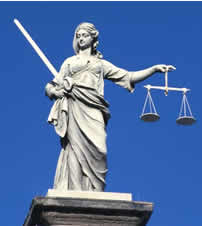Claims Ireland
The Independent Service that Assesses Compensation Claims
General Rules
General Rules for Proving Fault in Accidents
It's easy enough to say that the person or business that caused an accident must pay for your injuries/loss. But before you get to that point, you must determine who was legally at fault. Although solicitors and insurance companies would like you to think that legal responsibility, called "liability," for an accident is a complicated question, the answer usually requires nothing more than common sense.
Determining Legal Liability

Liability revolves around the simple fact that most accidents happen because someone was careless -- or "negligent."
Legal liability for almost all accidents is determined by this rule of carelessness, and by one or more of the following simple propositions:
- If the injured person was where he or she was not supposed to be, or somewhere he or she should have expected the kind of activity which caused the accident, the person who caused the accident might not be liable because that person had no "duty" to be careful toward the injured person.
- If the injured person was also careless, his or her compensation may be reduced by the extent such carelessness was also responsible for the accident. This is known as comparative negligence.
- If a negligent person causes an accident while working for someone else, the employer may also be legally responsible for the accident.
- If an accident is caused on property that is dangerous because it is poorly built or maintained, the owner of the property is liable for being careless in maintaining the property, regardless of whether he or she actually created the dangerous condition.
- If an accident is caused by a defective product, the manufacturer and seller of the product are both liable even if the injured person doesn't know which one was careless in creating or allowing the defect, or exactly how the defect happened. (For more information, see Proving Fault for Defective Product Injuries.)
How Your Own Carelessness Affects Your Claim
Even if you were careless and partly caused an accident, you can still get at least some compensation from anyone else who was also careless and partly responsible for the accident. The amount of the other person's liability for the accident is determined by comparing his or her carelessness with your own. The percentage of liability determines the percentage of the resulting damages he or she must pay. This rule is referred to as contributory negligence.
Example Bob was in a car accident in which he stopped short and was hit from behind. If the other person had been 100% at fault, Bob's injuries/losses would entitle him to £10,000 (EUR 15,000). However, the police accident report notes that Bob stopped short because one of a group of children next to a school looked as if he was going to dart into the street. The insurance company for the person whose car hit Bob from behind points out that Bob should have been going slowly enough in the school area to be able to stop without having to slam on his brakes.
In this case, not going slowly enough may have made Bob about 10% negligent. Because of this, the person who hit him is not liable to Bob for the full compensation of £10,000, but for only £9,000 (100% liability minus Bob's 10% liability = 90% liability).
There is no formula for arriving at a precise number for a person's comparative carelessness. During claim negotiations, you and an insurance adjuster will discuss all the factors that might have resulted in the accident. Then the question of your own carelessness goes into the negotiating hopper along with all the other factors that determine how much your claim is worth -- such as the seriousness of your injury and the amount of your loss.
Woman whose house gardaí unlawfully entered awarded €78,300 18-Jun-2019
Insurers not Telling the Full Story 26-Apr-2019
Creche Fall Compensation of €52k Award to Boy (9) Who Broke Thigh Bone More News
Just what the doctor ordered 12-Apr-2019
Guidance On Home Insurance Claims 22-Feb-2019
Have You Had A Septic Tank Claim Turned Down? More Articles
Join Our Panel
Since 2001, we have built up a great panel of solicitors, loss assessors and other experts in assisting with compensation claims, and now we’re looking to expand that panel. Our experts always aims to get members of the public the maximum compensation they deserve for incidents they have been involved in.
Are you interested in joining our panel?
Apply TodayPlease Support Us
We are a free to use service funded entirely by donations from the public. Your support is appreciated!
